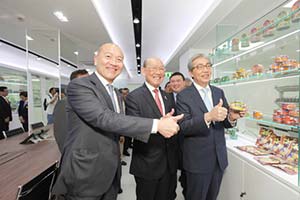The Bangkok-headquartered Thai Union Group (TU), a leading producer of tuna products, frozen shrimp and other value-added seafood items, is financing a pilot plant research and development center and post-graduate programs with Mahidol University, Kasetsart University and King Mongkut’s University of Technology Thonburi. Presiding over the launch during in a special ceremony was Deputy Prime Minister Somkid Jatusriptak, who has mounted a campaign to stimulate food cluster development, promoted as “Food Innopolis,” in Thailand.
 Thiraphong Chansiri (left), president and ceo of Thai Union, Kraisorn Chansiri (middle), the company’s chairman, and Deputy Prime Minister Somkid Jatusripitak preside over the opening ceremony of the pilot plant.The pilot plant is part of the Global Innovation Incubator (Gii), a joint effort in which TU has allocated 200 million baht (approximately $5.6 million) to study and advance technology for the production of tuna and other seafood products. The investment doubles the size of the facility to 4,800 square meters to allow ample workspace for scientists and researchers. It now houses a fully automated fish filleting machine, high-pressure food processor, radio frequency frozen fish thawing equipment, and a product innovation development unit in addition to chemistry and nutrition laboratories.
Thiraphong Chansiri (left), president and ceo of Thai Union, Kraisorn Chansiri (middle), the company’s chairman, and Deputy Prime Minister Somkid Jatusripitak preside over the opening ceremony of the pilot plant.The pilot plant is part of the Global Innovation Incubator (Gii), a joint effort in which TU has allocated 200 million baht (approximately $5.6 million) to study and advance technology for the production of tuna and other seafood products. The investment doubles the size of the facility to 4,800 square meters to allow ample workspace for scientists and researchers. It now houses a fully automated fish filleting machine, high-pressure food processor, radio frequency frozen fish thawing equipment, and a product innovation development unit in addition to chemistry and nutrition laboratories.
“The pilot plant and expansion of the Gii supports the government policy to make Thailand a key scientific and technological hub for research and innovation to add value to the food industry,” said Dr. Sittiwat Lertsiri, science faculty dean of the biotechnology department at Mahidol University.
Thiraphong Chansiri, president and chief executive officer of Thai Union, commented: “The Gii is core business strategy. We believe that innovation will contribute to business growth and help us achieve our $8 billion sales target by 2020. Innovation will further our competitiveness, differentiation and capacity in the world food industry.”
The Thai government has established a 10 billion baht competitiveness development fund to support innovation projects, as its Science and Technology Ministry and National Science Technology and Innovation Policy Office (STI) look for ways that the public and private sectors can cooperate to maximize the program.
Approximately 20,000 square meters of space at Thailand Science Park in the Khlong Luang district of Pathum Thani have been reserved for long-term lease usage to attract companies to build research centers at the Food Innopolis complex. In addition to seafood and aquaculture producers, it is targeting processors of fruits and vegetables as well as makers of food additives and ingredients, healthy fats and oils, and packaging materials.





